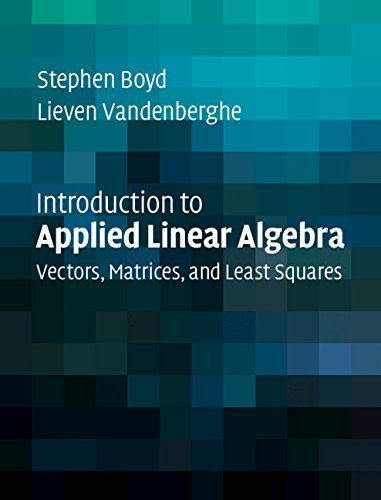7 Algebra Books That Separate Experts from Amateurs
Recommended by Trevor Hastie, Gilbert Strang, and other leading mathematicians for deep Algebra insight


What if the key to mastering Algebra wasn't just hard work but the right set of books? Algebra forms the backbone of countless fields from data science to engineering. Yet many struggle to find resources that truly unlock its mysteries. Experts like Trevor Hastie, known for his work in statistics and machine learning, and Gilbert Strang, whose MIT lectures have enlightened millions, have pointed to specific texts that transform understanding from rote memorization to genuine insight.
Trevor Hastie highlights Introduction to Applied Linear Algebra for its fresh perspective on linear models, while Gilbert Strang praises both this and his own Introduction to Linear Algebra for their clear explanations rooted in decades of teaching. Their endorsements come from deep engagement with these texts in research and classroom settings, underscoring their lasting value.
While these expert-curated books provide proven frameworks, readers seeking content tailored to their specific background, goals, and algebraic focus might consider creating a personalized Algebra book that builds on these insights. Such customization bridges the gap between comprehensive theory and your unique learning journey.
Recommended by Trevor Hastie
American statistician and computer scientist
“'The kings of convex optimization have crossed the quad and produced a wonderful fresh look at linear models for data science. While for statisticians the notation is a bit quirky at times, the treatise is fresh with great examples from many fields, new ideas such as random featurization, and variations on classical approaches in statistics. With tons of exercises, this book is bound to be popular in the classroom.'” (from Amazon)
by Stephen Boyd, Lieven Vandenberghe··You?
by Stephen Boyd, Lieven Vandenberghe··You?
During his tenure as a Stanford engineering professor, Stephen Boyd teamed with UCLA's Lieven Vandenberghe to craft a text that demystifies applied linear algebra through practical engineering problems. You’ll explore vectors, matrices, and least squares methods with examples drawn from data science, AI, and control systems, while exercises challenge you to apply concepts directly using Julia and MATLAB®. Chapters on random featurization and variations of classical statistical techniques broaden your perspective beyond traditional approaches. This book suits anyone ready to build a solid foundation in linear algebra for real-world applications, though it leans heavily toward engineering and computational uses rather than pure theory.
by Gilbert Strang··You?
by Gilbert Strang··You?
Drawing from over fifty years teaching linear algebra at MIT, Gilbert Strang crafted this book to present the subject with clarity and depth. You’ll explore foundational concepts like independent columns and matrix rank early, then advance through linear equations, eigenvalues, and singular values—all framed through matrix factorizations. Later chapters tackle optimization and data learning, reflecting the field's most active applications today. The text balances theory with applications, making it suitable if you want a solid grasp of linear algebra’s core principles and its relevance to science, engineering, and economics.
by TailoredRead AI·
This tailored book explores algebra through a lens that fits your unique background and goals, enabling a personalized journey into mastering key concepts and problem-solving techniques. It covers foundational principles and progressively examines complex topics, focusing on your specific interests and skill level. By synthesizing extensive algebraic knowledge, it reveals pathways that help clarify challenging ideas and supports your deep understanding of algebraic structures and methods. Designed to match your learning pace and objectives, this tailored approach encourages active engagement and practical application of algebraic thinking, making the learning experience both focused and rewarding. It opens the door to confident problem-solving and conceptual mastery by addressing what matters most to you.
by Sheldon Axler··You?
by Sheldon Axler··You?
Drawing from decades of academic leadership and mathematical scholarship, Sheldon Axler crafted this textbook to rethink how linear algebra is taught, deliberately postponing determinants to emphasize a deeper understanding of linear operators on finite-dimensional vector spaces. You’ll engage with a clear exposition of vector spaces, linear independence, eigenvalues, and inner-product spaces, enriched by over 300 exercises that sharpen your ability to manipulate these concepts. The third edition’s additions—like product, quotient, and dual spaces—extend your grasp beyond basics, making this ideal for advanced undergraduates and beginning graduate students seeking a solid foundation. If you want a book that prioritizes conceptual clarity over rote computation, this is well worth your time.
by Shin Takahashi, Iroha Inoue, Co Ltd Trend··You?
by Shin Takahashi, Iroha Inoue, Co Ltd Trend··You?
The breakthrough moment came when Shin Takahashi, blending his analytical background and passion for teaching, chose to explain linear algebra through a manga format. You’ll navigate core concepts like vector operations, matrix multiplication, and eigenvalues alongside engaging storylines that make abstract math tangible. By following Reiji’s tutoring journey, you gain skills in Gaussian elimination and subspace theory, all framed with playful, memorable examples such as karate tournaments and miniature golf. This approach suits learners who find traditional textbooks dry and want a more approachable, narrative-driven introduction to linear algebra’s essentials.
Paolo Aluffi's deep engagement with algebraic geometry and its ties to theoretical physics informs this undergraduate text, which takes a distinctive route through abstract algebra. You gain a solid grasp of modules, groups, rings, and fields, enriched by discussions on categorical principles that unify these concepts. For example, the book details the classification theorem for finitely generated modules over Euclidean domains and rigorously covers classical results like the Sylow Theorems and the Fundamental Theorem of Galois Theory. If you're navigating algebra with a serious mathematical curiosity and want a text that balances rigor and accessibility, this is well worth your time.
by TailoredRead AI·
This personalized algebra book offers a tailored journey through essential algebraic concepts, designed to match your background and learning goals. It explores key topics such as equations, functions, and inequalities, providing targeted daily lessons that build skills progressively. By focusing on your specific interests and practice needs, this book reveals a clear path to rapid improvement and deeper understanding. With a customized approach, it examines problem-solving techniques and conceptual insights relevant to your goals, making complex algebraic ideas accessible and engaging. This tailored guide bridges collective algebra knowledge with your unique learning pace, helping you gain confidence and mastery over 30 focused days.
After analyzing numerous math curricula, Reza Nazari developed this guide to address common gaps in Algebra II learning. You find hundreds of examples and over 1,500 exercises designed to build confidence and problem-solving skills progressively. The book covers all essential Algebra II concepts aligned with national standards, integrating interactive elements and digital resources to deepen understanding. Whether you’re self-studying or in a classroom, the included full-length practice tests and detailed solutions let you track your progress and prepare effectively for exams. It’s particularly well-suited for students seeking thorough practice and clear explanations without unnecessary complexity.
by Kuldeep Singh··You?
by Kuldeep Singh··You?
Kuldeep Singh's extensive experience teaching linear algebra at the undergraduate level informs this methodical guide, designed to demystify a subject often perceived as abstract and challenging. You’ll find a mix of historical context, practical problem-solving, and stepwise explanations that make complex concepts accessible, from matrix operations to eigenvalues. The inclusion of exam questions from diverse universities and online resources for self-testing offers tangible ways to build your confidence. This book suits undergraduate students in mathematics, engineering, and physical sciences who want a grounded understanding rather than a purely theoretical approach.
Get Your Personal Algebra Strategy in 10 Minutes ✨
Stop following generic advice. Receive targeted Algebra strategies that fit your needs without reading dozens of books.
Trusted by mathematicians and educators worldwide
Conclusion
These seven books form a rich tapestry covering everything from conceptual foundations to practical applications in Algebra. If you're aiming to build strong theoretical understanding, titles like Linear Algebra Done Right and Algebra deliver rigorous approaches. For those who prefer applied contexts and problem-solving, Introduction to Applied Linear Algebra and Linear Algebra by Kuldeep Singh offer accessible routes.
Beginners can gain confidence with Algebra II for Beginners, while visual learners may find The Manga Guide to Linear Algebra a refreshing alternative. Combining these resources allows you to tailor your study to your needs and challenges.
Alternatively, you can create a personalized Algebra book to bridge the gap between general principles and your specific situation. These books can help you accelerate your learning journey with the guidance of leading mathematicians.
Frequently Asked Questions
I'm overwhelmed by choice – which Algebra book should I start with?
Start with Introduction to Linear Algebra by Gilbert Strang for a solid foundation. It balances theory and application well, making complex topics approachable for newcomers.
Are these books too advanced for someone new to Algebra?
Not at all. Algebra II for Beginners offers step-by-step guidance ideal for those starting out, while The Manga Guide to Linear Algebra uses visuals to ease learning.
What's the best order to read these Algebra books?
Begin with beginner-friendly texts like Algebra II for Beginners, then move to foundational works such as Linear Algebra Done Right, and finally explore applied or abstract topics.
Should I start with the newest book or a classic Algebra text?
Both have value. Newer books like Introduction to Applied Linear Algebra incorporate modern applications, while classics such as Strang’s work provide timeless theory.
Do these books focus more on theory or practical application?
They cover both. Linear Algebra Done Right leans toward theory, while Introduction to Applied Linear Algebra emphasizes real-world engineering and data science uses.
Can I get a tailored Algebra learning plan instead of reading all these books?
Yes! While these expert books offer solid knowledge, a personalized Algebra book can tailor content to your goals and background. Learn more here.
📚 Love this book list?
Help fellow book lovers discover great books, share this curated list with others!
Related Articles You May Like
Explore more curated book recommendations






